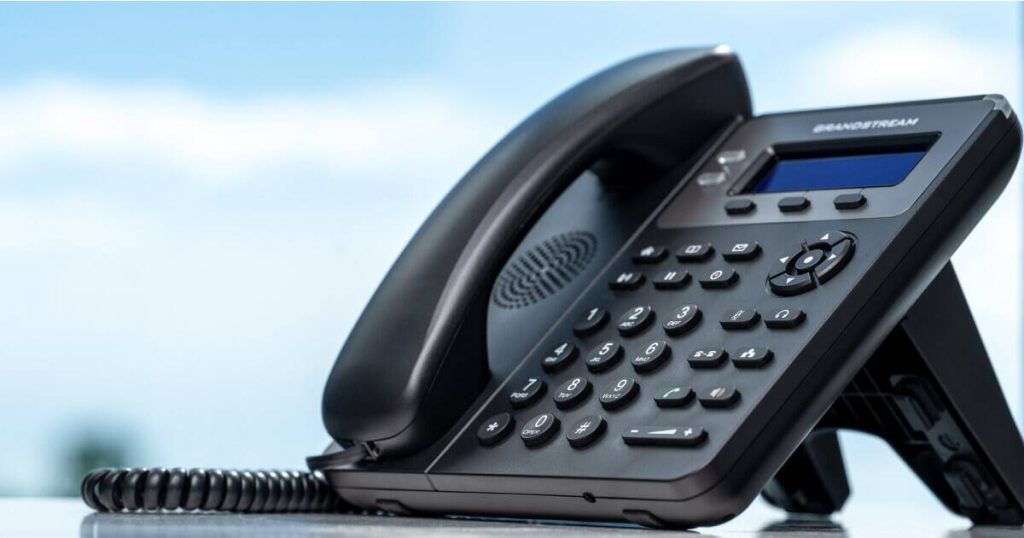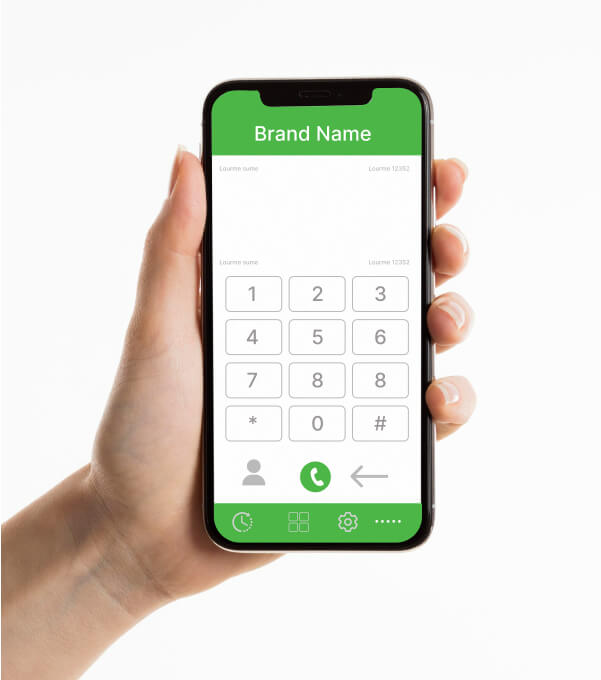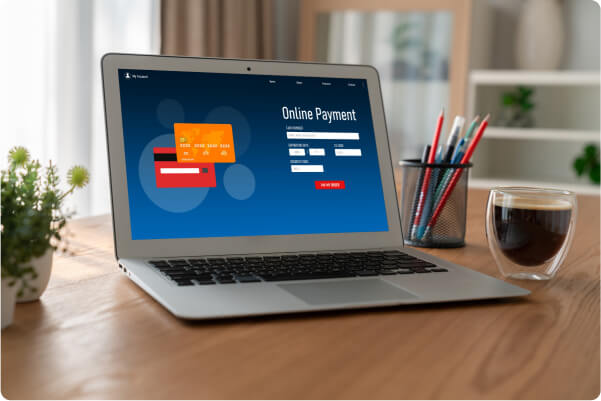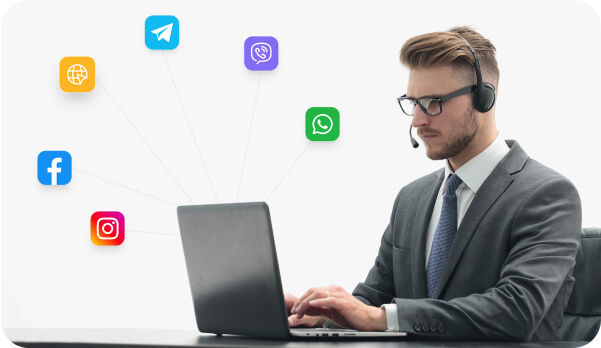
Today, smartphones are leading the charge. Mobile VoIP has completely revolutionized the way we make calls – it’s crystal clear and accessible from anywhere in the world, without spending a fortune. The penetration of 3G, 4G, and now 5G has led to the growing popularity of VoIP calling services in several countries. Mobile VoIP has plunged those traditional communication barriers which is why this market is booming at a rapid speed. Businesses and individuals across the globe are attracted to this market. If you too want to capitalize on this thriving market and build a successful VoIP business, then this blog will be your ultimate comprehensive guide. Here we will dive into every aspect of how to start a VoIP business, to transform your vision into reality. Even if you are already running a VoIP business, you will get much additional information in this blog that will help you optimize your existing business.
What is Mobile VoIP?
Also known as mVoIP, mobile VoIP is a technology that enables users to make and receive calls over the internet using their mobile phones, smartphones, tablets, or any other internet-connected mobile device. Through mobile VoIP, users can communicate conveniently as they can use mobile VoIP services no matter where they are. Setting up a mobile VoIP system is a very simple process. A user needs to have an active internet connection on his mobile device to start using it.
Why You Should Become a VoIP Provider?
According to Global Market Insights, the VoIP Market size in 2018 was over USD 20 billion and is estimated to grow at a CAGR of 12% from 2019 to 2025. Hence, you can imagine the potentiality of this business in the future. These figures have led many entrepreneurs to join this industry, which has also increased the competition level. There are many other compelling reasons why you should become a VoIP provider in the dynamic telecom landscape. Let me list out a few major ones:
-
VoIP is a Booming Market
Undergoing remarkable growth already, it has been predicted that the global VoIP market will reach a staggering $226.3 billion by 2027, growing at a CAGR of 16.4%. It’s certainly a lucrative opportunity to enter the market.
-
Recurring Revenue Generation
With a typical subscription-based pricing model, VoIP generates recurring revenue for providers. This predictable income ensures financial business stability.
-
Future Proof Technology
VoIP is constantly evolving. There are new opportunities for innovation and differentiation. By adopting new technologies and adding cutting-edge features to your service, you can ensure long-term success in the telecom landscape.
How to Start a VoIP Business? A Proven 6-Step Guide
To become a VoIP Service provider, there are a few infrastructure requirements. Here is a brief guide to the requirements to start a mobile VoIP business:
Step 1: Set up a VoIP Infrastructure (Hardware and Software)

Softswitch with Billing
Softswitch is the heart of the VoIP business that controls all transactions, customer records, call routing and invoice billing, and report generation in both prepaid and postpaid business models. Softswitch comes in various ratings, primarily based on the concurrent transactions it can handle. For example, a Softswitch can handle 1000 concurrent calls or a Softswitch can handle only 400 concurrent calls.
Apart from concurrent calls, there are other parameters like stability, security, scalability, ease of operations, call connectivity efficiency, call routing mechanisms, and other features, that will dictate your choice of Softswitch.
Generally, the Softswitch comes with inbuilt billing, but if it does not, then you need to invest additionally in the billing software. However, you should opt for Softswitch which has integrated billing functionality to ensure hassle-free business transactions.
Softswitch is available in licensed and hosted models. By license, it means you need to make a one-time payment to purchase the software. In the case of a hosted switch, you need to pay a monthly rental. Based on your budget and requirements, you can choose a softswitch for your communication business.
Bandwidth Optimization & Tunneling Software
This software component is necessary for retail operations, where the internet quality at the customer end may not be consistent. And, it also helps service providers offer their services in geographical areas where VoIP calls are blocked by firewalls.
Bandwidth Optimization software is also known as Byte Savers, and it is a popular industry term. This software, installed on the server side ensures that customers have a smoother quality experience, even if the internet through their 3G/ Wi-Fi connection is not always adequate to support VoIP calls.
Servers & Hosting
The above software is generally installed on enterprise-class servers that are hosted on Internet Data Centers (IDC), powered with high-quality bandwidth and 24/7 power/air conditioning while ensuring your services never go down.
You can lease server/bandwidth from IDCs around the world, the location of the IDC being dependent on your target market and/or quality of service of the IDC.
Step 2: Mobile VoIP Applications
If you opt for the retail VoIP services, then you will need to provide the applications that consumers will use to originate calls. For full-blown retail operations, service providers need to purchase the following software solutions:
Mobile Dialer

This is a mobile app that your customers will download on their mobile phones to make VoIP calls. There are multiple mobile VoIP clients available in the industry, but you should choose the one that offers a branding facility so that your brand will be present and visible to the customers. Mobile Dialers are also known as Mobile VoIP Applications or VoIP Softphone in different geographies. Being a communication service provider, you will want to run the VoIP services in your brand name, so you need to go for a White Label Softphone.
Apart from this, the mobile application must be stable, offer good voice quality, be able to support bandwidth optimization requirements and have an easy user interface that allows your clients to make calls even if they are not technology geeks.
Nowadays, most mobile VoIP app comes with features such as instant messaging, audio-video calls, file transfer, and end-to-end encryption to name a few. These attributes obviously can come at an extra cost depending upon the level of customization you want to include in your VoIP calling app. You can also get some OTT features if you go for an OTT app apart from a normal calling application.
Calling Card

You need to offer a calling card facility to retail customers, who want to access VoIP services but do not have internet available on their mobile phones.
To offer this option to customers, you will need to ensure that your Softswitch supports calling cards and has a DID (Direct Inward Dial) or local telephone number configured with it.
Here, DID is a local telephone number that your customers will dial into – thereupon be greeted by an IVR voice system, which will ask them to enter their destination number and the call will be connected.
Call Shop
If you are planning to offer retail services, the call shop feature is a must-have for doing business in many countries, wherein customers go to call shops to make cheap long-distance calls. This feature allows call shops to manage multiple customers calling infrastructures i.e. from PCs/ devices/ mobile phones. The call shop feature can identify and bill the consumer accordingly and easily while maintaining full control of their operations. REVE Systems’ Softswitch, iTel Switch offers an advanced call shop feature, which is used by many retail service providers around the world.
Step 3: Own Website, with Credit Card Payment Gateway Support

If you are in the VoIP business, you will get potential customers from all around the world. To provide services efficiently to your customers from various geographies, you will need a fully functional website. This will be your brand’s main channel where customers get all sorts of information about your VoIP business. Besides attracting customers with valuable information on the website, you also need to ensure that the website makes a good impression in terms of User Interface, Navigation, etc. Some useful interactive functionalities are an Automated Sign-up process, Resource Center, Customer Accounts, etc.
Apart from this, the website must support payment options like Credit Cards, PayPal, etc. So, customers can pay you seamlessly and use the services.
Our Recommendation: Analyze your competitors’ websites and identify the functions included by them.
Step 4: Inter-Connecting with Terminating Carriers
To terminate the calls to your customers, both in the retail and wholesale business, you will need to interconnect with multiple carriers across the globe who will offer you various termination destinations. It pays to connect with more carriers, so that you have enough choice of rates and destinations, both in terms of cost and quality.

For example, if you are terminating calls to the USA, different carriers will offer different rates and quality of services – so you will need to choose these carriers based on their market reputation and quality achieved during your interconnect tests.
These carriers offer destination rates in USD/ min terms; for example, the rate to the USA could be 0.008 – which means for every 1 minute of a single call terminated through their network, they will charge you 0.008 USD.
The termination cost is the single largest variable cost for VoIP operators and hence, you will need to be diligent in choosing carriers and maintaining your accounts with them. If you are into a VoIP Wholesale Business or want to start one, this is the most important segment you have to consider. Also for a VoIP Wholesale business, you will need a Class 4 Softswitch. Using a Class 4 Softswitch, you can manage your wholesale traffic easily.
Step 5: Find Customers

By now, you have built a business model along with all critical components. Like in other businesses, here you will also need to find customers after you are done establishing the infrastructure and other basic requirements. So, whether you are in retail or wholesale VoIP services, you will have to find customers and offer competitive rates with good quality services. Here are some tried and tested ways that you can follow to find your target customers:
- The first thing you can do is to network with professionals who are already in the VoIP industry. You can do this by joining different LinkedIn groups that focus on the VoIP industry. You can also register and attend various telecom and VoIP tradeshows or events that happen from time to time.
- Your second move can be about building your credibility in the market. But how do you do that? Testimonials are a popular way to showcase your brand’s trustworthiness in front of potential customers. You can ask someone from your professional network to test, use, and provide feedback. You can add this testimonial to your website and marketing materials so that your audience can see it.
- Utilize marketing of all sorts to reach your potential customers from all ends. There are several marketing channels such as social media, SEO, content marketing, advertising, etc., to build your customer base and grab high-quality leads.
Step 6: Customer Support
Once you have started acquiring customers and get customer transactions/ calls, you will have to ensure customer support, so that you can address your customers’ problems. These days, VoIP users often seek IT and troubleshooting assistance when they start and as they use the service. So you need to ensure a dedicated IT and support team for these customers.

If you are serving a global customer base, you will also have to ensure full 24/7 support, for your customers to reach you whenever they have any service disruption.
At REVE Systems, we offer 24/7 support to all of our customers, through our network of support engineers. It is a fully functional support portal with trouble ticket opening with live chat facilities.
The other important aspect here is – how your customers are going to get in contact with you when they need your assistance. For this, you need to deploy an omnichannel customer support system. You can consider the following options:
- Live Chat: This option allows customers to chat with support agents in real-time.
- Phone Support: Have dedicated customer service numbers and list them out so that customers can directly dial and get the required assistance.
- Email: A dedicated customer support email address can help manage support queries in a better way.
- Online Guides and Manuals: Providing your customers with online manuals and guides for troubleshooting can be a lot helpful for your customers. It can significantly reduce the amount of customer support calls.
Bonus Tip: Make sure to include a Customer Support section on your website. With a dedicated section, your customers can easily get in touch with you for help and support.
Quick Video on How to Become a VoIP Service Provider
Ready to Become a Leader in Mobile VoIP?
To start a mobile VoIP company, you will need to have a clear objective and a solid plan in mind. The above steps will act as your checklist for how to set up your own VoIP business. If you wish to start your journey, our team of experts is ready to help you anytime.
Read Also
Which Mobile VoIP Features Boost Your Business Revenue
How to Start a Calling Card Business
Note: This blog has been updated with the latest facts and information on 12th Feb 2024.






























Pingback: Question to Ask from SBC Vendors when Buying Session Border Controller()
Pingback: Customized Mobile Dialer | VoIP Dialer Software| Branded Mobile Dialer – REVE Systems()